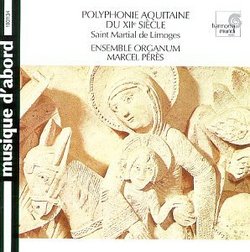| All Artists: Josep Cabre, Philippe Balloy, Aquitanian Repertory Anonymous, Gérard Lesne, Ensemble Organum, Marcel Peres, Josep Benet, Dominique Vellard Title: Polyphonie Aquitaine of th 12th Century Members Wishing: 0 Total Copies: 0 Label: Harmonia Mundi Fr. Release Date: 7/14/1998 Album Type: Import Genres: Special Interest, Classical Styles: Opera & Classical Vocal, Historical Periods, Early Music, Symphonies Number of Discs: 1 SwapaCD Credits: 1 UPC: 794881420926 |
Search - Josep Cabre, Philippe Balloy, Aquitanian Repertory Anonymous :: Polyphonie Aquitaine of th 12th Century
 | Josep Cabre, Philippe Balloy, Aquitanian Repertory Anonymous Polyphonie Aquitaine of th 12th Century Genres: Special Interest, Classical
|
Larger Image |
CD Details |
CD ReviewsGood value for your money Jennifer | Toronto | 02/21/2001 (4 out of 5 stars) "This CD, containing a selection of 12th century French church choral music, is a good buy. The general style of the music is similar to that of the recently popular Gregorian chants, but with a greater variety of arrangements. The recording includes works for choir, solo voice and duets (all male), and solo organ. The recording is clear and crisp and the program notes are informative. The Latin text of the music is translated in the notes, however the translation is in French." Captivating Tunes Michael A. Brennan | Chicago, IL | 10/31/2006 (4 out of 5 stars) "Astounding harmonies, hypnotic, restful, great echo. I bought this as part of a boxed set and found myself listening to "Aquitane" to the exclusion of the other material. There is something comforting and familiar and strangely accessible. The fourth hymn, "O Primus Homo Coruit," has a particularly appealing melody and engages the mystical in a way comparable to gazing at an elaborate stained glass window. "Jube Domine, Puis Lecture: Primo Tempore" will remind some of the scene in Monty Python & the Holy Grail when the monks chant and strike themselves with their Bibles. I like the first five selections best. Often play as I drift off to sleep." Three Used Copies at Scalper's Prices! Giordano Bruno | Wherever I am, I am. | 08/25/2008 (5 out of 5 stars) "The repertory of liturgical chants from St. Martial de Limoges is especially important in the history of European music, representing the precise birth moment of polyphony and all subsequent harmonic and structural development. This CD is the very best performance of the stuff ever made, with vocal superstars Gerard Lesne and Dominique Vellard participating. But why say more? It's unavailable. Rats! Check your local library or borrow it from a friend."
|

 Track Listings (12) - Disc #1
Track Listings (12) - Disc #1